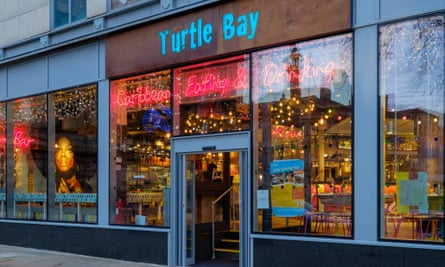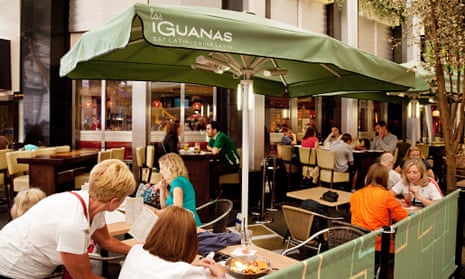Waiters at major restaurant chains say they are being forced to “pay to work” on some shifts because of a tipping policy that means they have to hand over cash to their bosses at the end of the night.
Las Iguanas, a chain serving Latin American food at 41 branches in the UK, and the Caribbean chain Turtle Bay, which has 19 restaurants, operate a policy that requires staff to pay back to their employer 3% of the table sales they generate on each shift. That figure rises to 5.5% in Las Iguanas’s London restaurants.
If a waiter sells £1,000 of food and drinks in an evening, they have to pay £30 back to the restaurant in cash at the end of the night. At Las Iguanas’s London restaurants, the payback would total £55. The money is meant to be paid by waiters from their pot of tips but, because it bears no relation to how much a waiter actually takes in tips, it can wipe out his or her entire income from gratuities in a busy night.
The policy has come to light following a recent story in the Observer about Pizza Express staff who are staging a series of demonstrations to try to stop the chain creaming off 8% of tips paid to them on credit and debit cards.
“This policy is far worse than that of Pizza Express,” said Perry Phillips, London regional officer at the GMB union, which is pursuing a complaint about Turtle Bay on behalf of some of its members. “The fact that these restaurants are taking money off the waiting staff regardless of the tips they earn is unjust, unfair and downright disgraceful.”
The policy appears to be a moneyspinner for the chains. The Observer has obtained figures that indicate that in one week this year Las Iguanas took £34,000 from its servers across all its branches from the sales charge. If this represents a typical week, over a year it would amount to £1.8m. The chain said it could not comment on the figures.
The companies justify the policy by saying that it allows them to share tips with non-waiting staff through staff development and reward schemes.
According to a Turtle Bay employment contract seen by the Observer, where tips don’t cover the 3% payment, staff “will be required to make up the benefit of any shortfall in the next or subsequent shift, or in the event of leaving the company by a deduction from wages due, such that the deduction does not reduce your effective rate of pay below the minimum wage”.
However, one Turtle Bay waiter claimed there were occasions when she hadn’t made enough tips to cover the charge and had been asked for the money anyway. “The other night I had a lot of tables that didn’t tip me and one that spent close to £150 but gave me a £2 tip,” she said. “The tips didn’t cover 3% of the sales I’d made, and by the end of the night I had to get £20 out of my pocket and give it to my manager.”
Turtle Bay did not comment on the allegation. In a statement about its tipping policy it said: “The 3% is a calculation on a server’s total sales, and in the vast majority of cases customers will leave in excess of 10-15% of their bill as tips. In addition, a 10% service charge is added to all tables of five or more, which the server also keeps. We are not aware of any occasion where a floor server has not earned any tips.”

One waiter who works for Las Iguanas says she pays back an average £25 to £30 a shift because of the 3% policy. “Over five shifts in a week is a substantial loss of my tips,” she says. “Sometimes it works out as if I am paying to work, as for a five-hour shift I am paid £32.50 before tax.”
Waiters are paid the minimum wage of £6.50 an hour, which is due to rise to £6.70 in October. A general manager at one of Las Iguanas’s branches spoke to the Observer on condition of anonymity. He is charged with the job of calculating the amounts that servers owe at the end of the night and then asking them for the money. “I am lucky as the company pay the general managers well, but morally I find it totally wrong to take money off the waiting staff,” he said. “One night recently I felt terrible because a staff member had made £125 in tips and I had to ask her for £65 back.”
He added: “Most of these waiters are just kids. The way the policy is sold to them is that the money is for recognition and development, but that is no way to take care of your staff.”
Las Iguanas, whose founder, Ajith Jaya-Wickrema, was also one of the founders of Turtle Bay, has just been bought by the Casual Dining Group, the chain that owns Bella Italia, Café Rouge and Belgo. The tipping policy across the Casual Dining Group chains is to take 10% of tips paid on cards as an admin fee. The group said no changes had been made to Las Iguanas since it was purchased last month.
Las Iguanas said that although it did charge 3% of sales, it only took this where the tip pot would cover it and that staff never had to pay back money from their wages. “Our tipping policy has been well-established for around 20 years and, among other things, enables us to ensure that tips generously given by our guests are shared throughout the whole team so everyone feels rewarded,” said a spokesman. “Over many years we have always made our staff very aware of how we distribute and share tips and we believe the vast majority like and accept the approach we take because of the wider benefits they receive.”
It has also emerged that another restaurant chain in London, Gaucho, which serves steak dishes that cost up to £99, takes 16% of staff tips and puts part of this towards “staff incentives and competitions”. It also takes a further 2.3% each month from sales generated by each waiter, which is shared among non-waiting staff.
A Gaucho employee told the Observer that in one month they earned close to £500 in tips but, because of a combination of the two deductions, more than £400 of that was retained by the company. “I am all for sharing with other staff. However, with this new system we are literally coming away with none of our card tips,” she said. “This is very unfair as we work very, very hard and we have a very high level of wine knowledge and expertise. Aside from not being justly paid for our knowledge, we have rent to pay and mortgages.”
Gaucho said: “The earnings of waiters in Gaucho are well above the industry standard, and waiters in Gaucho share their tips and service with hourly paid kitchen, reception and bar staff on the basis of their seniority and length of service.”
Last week a further tipping scandal came to light when the London Evening Standard reported that a French restaurant chain, Côte, retains the entire 12.5% service charge that it adds to customers’ bills rather than giving it to their staff .
Restaurants’ tipping policies have always been controversial but appear to have become worse since Labour was ousted from power. The Labour government put in place a voluntary code of practice for restaurants that was meant to tackle some of the worst tipping policies. However, that has since “died a death”, says Dave Turnbull, officer for the food and drink sector at trade union Unite.
“The coalition came in and did not review the code of practice to see that it was being followed,” he says. “That has effectively opened the doors for restuarants to go back and find new ways to extract money from their staff.”
